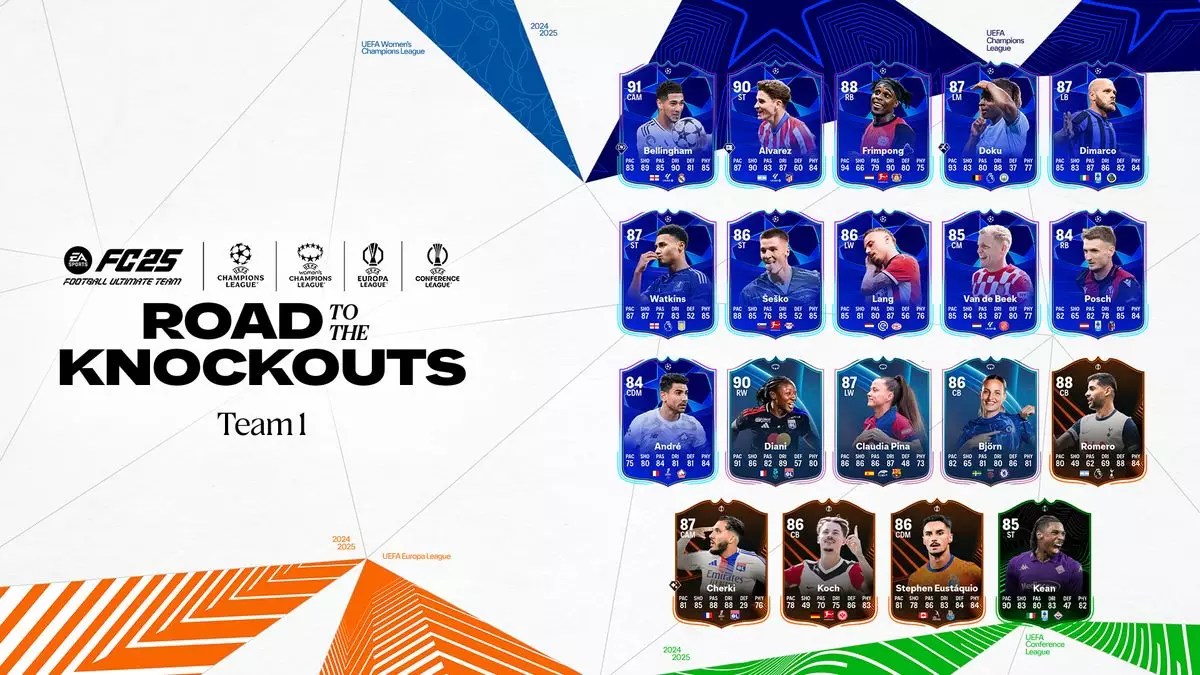As EA continues to develop its football simulation series, the introduction of the FC 25 RTTK Tracker marks a pivotal enhancement in player engagement through dynamic card upgrades. RTTK, or Road To The Knockouts, represents an innovative campaign that allows players to witness the real-time evolution of their favorite characters based on European league performances. This article explores the structure and implications of this campaign, highlighting key players, upgrade mechanics, and overall player experience.
At its core, the RTTK initiative is built on the premise that players can receive upgrades reflecting their real-life team achievements in prestigious European competitions like the UEFA Champions League and the Europa League, among others. For players such as Jude Bellingham and Diogo Jota, this could mean substantial in-game performance boosts if their respective clubs excel. This innovative approach introduces a thrilling layer of interactivity, where not just individual performances, but overall team success dictates a player’s potential ratings, shifting player dynamics according to actual match outcomes.
However, this system brings forth its challenges. While the team-based improvements engender a sense of collective achievement, it risks overshadowing individual contributions. For example, a player who regularly performs excellently may find their stats stagnant if their team fails to deliver in key matches. This dynamic could prove frustrating for players who prefer individual accolades over team-oriented outcomes. Still, the joy of seeing a beloved player rise in stature due to their team’s success might outweigh personal disappointments.
Jude Bellingham’s emergence as the focal point of Team 1, boasting an impressive rating of 91, illustrates the campaign’s ambition. Should Real Madrid excel in their Champions League journey, Bellingham’s overall rating could surge to 93. Other stars like Julian Alvarez, currently rated 90, and Jeremie Frimpong at 88, reflect the diversity and excitement of the card line-up. Additionally, the inclusion of women’s players like Kadidiatou Diani reveals EA’s commitment to inclusivity, allowing for a richer, more diverse experience in the game.
Interestingly, the RTTK concept is not solely about high-rated players but also involves mid-tier stars who can evolve through collective achievements. The presence of players from various leagues, including Cristian Romero and Rayan Cherki, opens doors for new fan-favorite cards to emerge as the contest progresses.
The mechanics driving RTTK upgrades are not only strategic but intricate, presenting multiple ways in which a player can enhance their rating. Each player’s pathway to improvement hinges on specific club objectives, with potential boosts available for three different achievements. This consists of parameters like winning a set number of matches, scoring in consecutive games, or securing a top tier position within league tables.
EA has emphasized the metrics for gauging player performance upgrades. Clubs need to triumph in three league phase matches for a +1 OVR increase, among other stipulations, creating a distinctive blend of competition and strategy. However, the one limitation is that a maximum of three total upgrades is attainable, maintaining a level of realism and challenge within the game framework.
This systematic approach advances gameplay experience, as players will continuously follow the progression of their cards—a dimension that injects live sporting events into the virtual realm. Match weeks serve as critical checkpoints for assessing player stats, and the excitement of watching updates in real-time encourages ongoing engagement.
With the FC 25 RTTK rollout, there’s an anticipated evolution in how players engage with EA’s football simulations. Community speculation surrounding RTTK Team 2 adds to the excitement. As fans await further releases and card details, players are not merely awaiting outcomes; they are actively interacting, discussing strategies, and evaluating potential trades based on evolving metrics.
EA’s decision to implement this kind of dynamic card upgrade mirrors broader trends in sports gaming, encouraging an interactive community that thrives on real-world performance analytics. The anticipation surrounding UP or DOWN speculations for player cards opens avenues for strategic gameplay and savvy in-game decisions.
As players take to online forums to express their thoughts, the conversation evolves into more than gameplay; it becomes about a shared love for football and strategic engagement with the game’s mechanics. While the complexities of the RTTK system create certain frustrations and hurdles, it ultimately serves to deepen player involvement and satisfaction within the EA football series.
The launch of the FC 25 RTTK Tracker not only signifies an innovative gameplay mechanic but also underscores EA’s commitment to enhancing the football simulation experience—allowing fans to witness their favorite players thriving in the competitive spirit that defines European football.


Leave a Reply